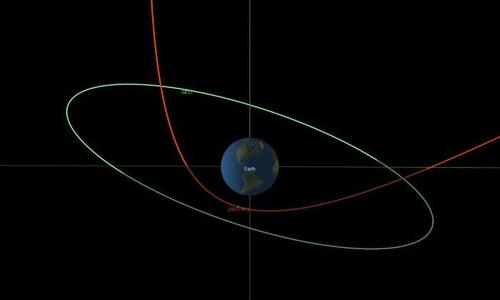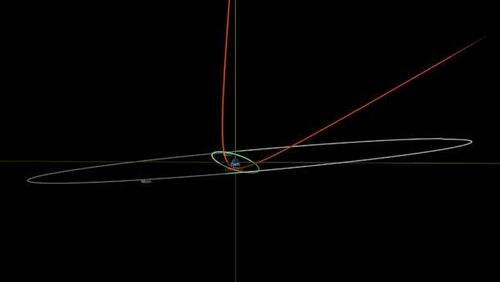See other Science/Tech Articles
Title: New Earth phenomenon is making heads spin [TEOTWAWKI - Trash Thread]
Source:
Fox Business
URL Source: https://www.youtube.com/watch?v=KEHyKB-oZTQ
Published: Jan 27, 2023
Author: Kennedy
Post Date: 2023-01-27 08:47:03 by Esso
Keywords: None
Views: 1365
Comments: 11
Poster Comment: R.E.M. - It's The End Of The World As We Know It (And I Feel Fine)
Post Comment Private Reply Ignore Thread
Top • Page Up • Full Thread • Page Down • Bottom/Latest
Begin Trace Mode for Comment # 7.
#1. To: All (#0)
"Near Miss": Asteroid To Make One Of 'Closest Ever' Approaches To Earth On Thursday An asteroid about the size of a big truck will buzz the earth on Thursday - coming within 2,200 miles of the planet's surface in one of the closest passes ever recorded, according to scientists at NASA's Jet Propulsion Laboratory. The asteroid, 2023 BU, will travel over the Pacific Ocean west of southern Chile this afternoon according to JPL's Davide Farnocchia, a navigation engineer. Not to worry (of course they'd say that) - but the near-Earth object poses no danger, according to Farnocchia. "It’s not going to break up," he said. "It’s going to zoom past Earth, say hello and move on." And even if it did enter Earth's atmosphere, it would have burned upon entry and turned into a fireball. "It’s not going to get close enough for that," the scientist continued, adding that the flyby will be the fourth-closest approach ever recorded - with the first two in 2020 and 2021, the WSJ reports. The Scout impact detection system was developed by Farnocchia, who says he received an alert from the system while having dinner. "When you see that alert, you just want to make sure that it’s real," he said. "So usually I just go and see the data and confirm it’s real and that everything is checked out." "Some of them actually can come really close to the Earth, and some of them might never come close to the Earth. That is just the first cutoff to split objects that could be potentially interesting and the ones that certainly are not."
Useless Googletards Cry Online As They Get Fired During "Strong Economy"
Jill Biden knocked for blocking reporters from president: 'Nobody elected her' [Kind of related] Mass Antifa BLM RIOTS Feared As Tyre Nichols Footage Getting Released, NATIONAL GUARD DEPLOYED
My new clock: What do I care what time it is? The call or text comes and I roll.
MEMES OF THE DAY - PR0J3CT V3R1TAS DOES IT AGAIN New Project Veritas Investigation Turns BONKERS When James O'Keefe Reveals They Got 'Em on Tape!
#8. To: All (#7)
(Edited)
Eggs, 18 - $4.89 up 0.50 The had everything I went for except for frozen, breaded chicken strips, which isn't too bad. They're making M&Ms in choc/PB and choc/caramel now, 34oz - $12.99 Those should both be illegal. (Edit) They really shouldn't allow me in the grocery store without adult supervision. (Edit 2) The weather's crapping out...
Top • Page Up • Full Thread • Page Down • Bottom/LatestYesterday:

The estimated trajectory of asteroid 2023 BU, in red, and the orbit of
geosynchronous satellites, in green. (NASA/JPL-Caltech via AP) 
2023 BU was first spotted by amateur astronomer Gennadiy Borisov, from his observatory in Nauchnyi, Crimea, on Jan. 21. More observations were reported to the Minor Planet Center, a clearinghouse for the position measurement of small celestial bodies. And after the discovery was announced, observatories around the globe added to the findings, helping astronomers refine 2023 BU’s orbit, according to NASA.
NASA’s impact hazard assessment system, which is based in Southern California and called Scout, analyzed the data and quickly predicted the near miss. -WSJ
#2. To: All (#1)
#3. To: All (#2)
(Edited)
#4. To: All (#3)
maxiaids.com

#5. To: All (#4)
#6. To: All (#5)
(Edited)
#7. To: All (#6)
Replies to Comment # 7. Georgetown Kroger sit-rep 01/27/2023:
Frozen mac & cheese, 20oz - $3.00 was 2.50
Bread, white sand - $1.99
Bacon, 1lb - $4.59
Milk, whole, gal - $3.29
Onions, yellow, 3lbs - $2.49
Whiskey, Windsor Canadian, 1.75l - $14.99
End Trace Mode for Comment # 7.